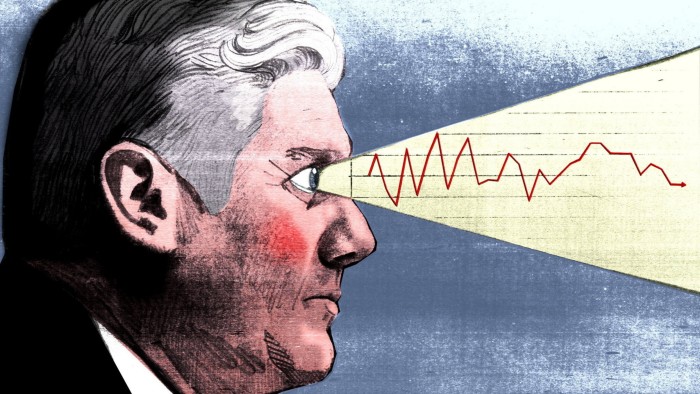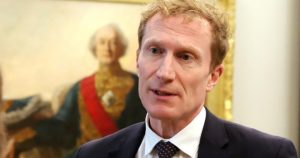Time for Keir Starmer to remember he is first lord of the Treasury

Unlock the Editor’s Digest for free
Roula Khalaf, Editor of the FT, selects her favourite stories in this weekly newsletter.
Sooner or later every prime minister remembers that their formal title is first lord of the Treasury. No matter how harmonious the relationship with their chancellor, there is always a moment when a leader concludes that not everything can be left to Whitehall’s economic ministry. For Sir Keir Starmer, that moment is overdue.
If there is one trend worth watching for next year, it is the first signs of friction between Starmer and his chancellor, Rachel Reeves. What is more, this is how it should be. The prime minister and the chancellor have different jobs. The latter is there to manage the public finances and economy; the former is supposed to see the wider picture and intervene when necessary.
To be clear, I am not suggesting a looming split between Starmer and Reeves, that he has lost confidence in her or is wavering on Labour’s growth strategy. The two are strongly aligned and Reeves remains one of his most trusted and important allies. The fault lies with Starmer. In part, his approach reflects his entire leadership style. He believes in delegation and, colleagues say, visibly dislikes being called in to adjudicate between his ministers.
But “I have a woman who looks after this for me” is not a viable approach. For all they trust Reeves, those close to Starmer worry he devolves too much control to the Treasury. A number of senior Labour figures now regret the heavy political cost of the move to means test winter fuel payments for pensioners. They feel it shows that Number 10 has to be more active in sense-checking, not merely agreeing to, Treasury ideas. There were arguments for the move. It signalled to both markets and Labour MPs a readiness to take tough decisions. But the backlash has eroded support and confidence.
Given the central position of economic growth to his policy platform, Starmer’s Downing Street is remarkably passive. The Treasury has filled the vacuum, as it always does. Part of the problem is that the prime minister evinces little natural appetite for economic policy. He has shaken up his political operation but aside from Labour’s long-standing and wide-ranging policy director, Rav Athwal, there is no significant economic adviser in Downing Street. His most important officials, the new cabinet secretary among them, are also light on Treasury experience. No government wants the instability of rival camps in Number 10 and 11 but the prime minister needs to be able to challenge decisions. A good premier improves their chancellor.
Successful prime ministers have to provide a bit of grit in the machine. Even the closest partnerships — David Cameron and George Osborne are often cited — require a leader who can push back on Treasury orthodoxy and inject a bit of political nous into decisions. This will become even more necessary as the Treasury completes its two-year spending round. Ministers must be able to get a hearing from Number 10.
Greater political engagement and economic brainpower in Number 10 looks essential. Amid worrying data and unpopular tax rises Labour is losing control of its growth narrative, Starmer’s avowed central mission. While there is much to applaud in Labour’s planning and pension reforms, they offer little short-term dividend. Reeves maintains that the first year was bound to be tough and that people must hold their nerve. One ally argues: “It’s only been five months.”
Yet confidence has been rattled not only by the winter fuel decision but by the substantial increase in employer national insurance contributions, a tax on jobs and business. Meanwhile, the bulk of new investment is going into public services rather than sectors that might boost growth. This is all understandable given the inheritance, but it does not make for a strong story to sell to business and investors. Taxes are up. The Brexit realignment feels more like mood music. While Starmer voices frustration at financial and environmental regulators stymieing growth, he has increased the regulatory burden on employers.
There is no current prospect of a major rethink but key figures can see the need for more near-term measures to boost business confidence and persuade foreign investors to look again at the UK. Even friends are worrying. Sir John Kingman, the City grandee and ex-Treasury official, this week appointed to Labour’s industrial strategy council, wrote last month that “we’re going to need a bigger bazooka”.
Labour does not feel able to cut taxes and its instincts are not deregulatory. A change of pace and emphasis will be needed if ministers are to lift the mood and lure foreign investors. Kingman’s suggestions include far more ambitious steps to develop the Oxford-Cambridge arc, with greater commitments to laboratory space, homes and infrastructure. This would be a signal of a country investing in its strengths.
A “change of tone” is promised in the new year. Starmer, Reeves and others will do more to talk the country up. But it takes more than words to shift business sentiment.
This is not about undermining or breaking with Reeves but a more active use of the role of prime minister, cajoling, challenging, demanding more. Starmer is temperamentally suited to holding his nerve but sometimes a touch of impatience is needed. This issue more than any other will determine the fate of his government as well as of the country. Just occasionally that means a greater readiness to be the title he holds.
#Time #Keir #Starmer #remember #lord #Treasury




